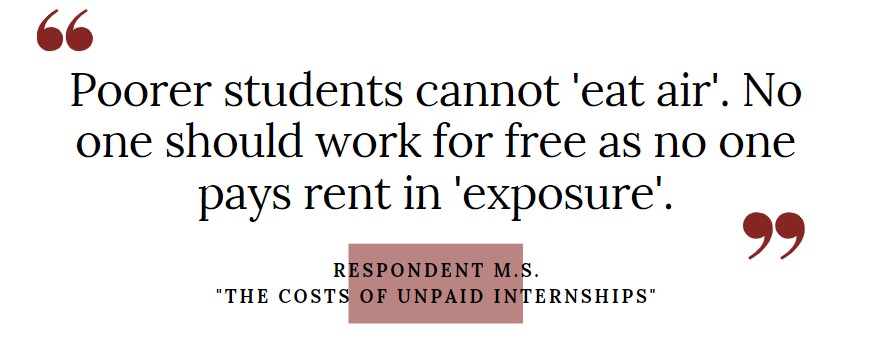Doing an unpaid internship costs an average young person in Europe over €1,000 per month (and in Belgium, even up to €1,300/month) – a figure that is expected to be even higher in 2023 due to the cost of living crisis, a new study by the European Youth Forum shows.
The data-driven study – called ‘The Costs of Unpaid Internships’ – was published on Monday and shines a light on the significant financial burden that unpaid internships place on young people, and the ways in which this practice can disadvantage those from lower socio-economic backgrounds.
“Our research exposes how unpaid internships deepen inequality among young people coming from different social backgrounds, impose unbearable costs on families, threaten the mental health of young people and create unfair distortions of the labour market,” María Rodríguez Alcázar, the European Youth Forum’s President told The Brussels Times.
As the EU Parliament is currently working on a Report on Quality Traineeships, and the Commission began reviewing the Quality Framework on Traineeships, the European Youth Forum is now calling for a binding EU Directive that would guarantee “quality, fair and paying working conditions” for internships in the open labour market.
‘Ramen Noodles only’ budget
Nearly 70% of respondents stated that they would not be able to afford unpaid work in the next six months: those coming from households in the lowest economic class were four times less likely to be able to afford an unpaid internship than people in medium standing economic households, and eight times less likely than those in the highest economic ranks.
Strikingly, by comparing an average low-income salary in each European country with what the researchers defined as a “Ramen Noodles only” budget – the monthly costs for only the bare minimum: rent, food, transport and other necessary expenses – it turned out that young people from marginalised backgrounds even had increased difficulties taking on internships for which they did get paid.
On average, a young person with a low-income salary, should be able to afford this budget for basic costs and still have a free budget of €175 at the end of the month. But in 12 out of 27 EU countries, the free income at the end of the month was negative – meaning it was not enough to fully cover basic expenses.
“Unpaid internships are how privileged individuals get to keep their (economic) privilege,” one of the respondents to the survey said. “Poorer students cannot 'eat air' and the fact that corporations that make so much money do not provide pay and are instead getting free labour is a scam. No one should work for free, you can't pay rent in 'exposure'."
More than half of the respondents (53%) also said that they had at least two unpaid internships before they found a paid job. Taking into account that interning without pay costs young people about €1,000/month and an internship lasts about six months, two unpaid internships would cost at least €12,000.
“It is a matter of dignity, well-being and concrete actions for our generation and the future. The practice of unpaid internships has a direct negative effect on the finances, future and mental health and wellbeing of young people and the EU must act to end it,” said Rodríguez Alcázar.
Young people also pay for their unpaid internships with their health and well-being, Alcázar stressed. “Most of the time, they also have a side job to compensate for the fact that they are working for free. This often means that they are working very long hours, which in turn causes stress and anxiety, and also affects our own sense of self-worth.”
Well-being issues are further exacerbated by poor-quality internship conditions, leading to many interns reporting feelings of worthlessness in the workplace. On top of that, many interns also stated they did not have a signed contract, leaving them exposed to precarious working conditions.
“Unpaid internships also limit the access of young people to the welfare system, both as contributors and beneficiaries, preventing a fair and just future,” Rodríguez Alcázar said. “That leads to a situation we just cannot afford as a society, so this needs to change.”
Related News
- Francophone socialists want basic income for young people
- Flanders simplifies and funds internships to get people into work
- 'Abuse of young workers': Belgium ordered to ban unpaid internships
In Belgium, Federal Economy and Employment Minister Pierre-Yves Dermagne has actively been working on closing the legislative gap that allows the practice of unpaid internships, ever since the European Committee of Social Rights' ruling early last year, his cabinet told The Brussels Times.
Last year, he pushed Belgium's regional labour ministers to ensure that institutions and administrations under their jurisdiction would not apply the practice. Dermagne has stated that he will make "every effort, at all levels" to combat and eliminate unpaid internships which are disguised employment. On Friday, he also included several concrete actions to fight the issue in the Federal plan to combat social fraud.
"It is clear: internships should be a way to learn something," Dermagne's spokesperson said. "When it comes to disguised employment, there is a problem. When, on top of that, the intern has to incur costs as well, the world is completely upside down."


